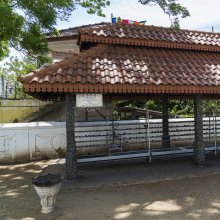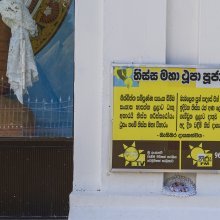Pum, Puṃ, Pūṃ: 10 definitions
Introduction:
Pum means something in Buddhism, Pali, Hinduism, Sanskrit, biology, Tamil. If you want to know the exact meaning, history, etymology or English translation of this term then check out the descriptions on this page. Add your comment or reference to a book if you want to contribute to this summary article.
Images (photo gallery)
In Hinduism
Vyakarana (Sanskrit grammar)
Source: Wikisource: A dictionary of Sanskrit grammarPum (पुम्).—Or पुंस् (puṃs) masculine. It appears that both पुभ् (pubh), and पुंस् (puṃs) were current terms meaning 'masculine ' in ancient days. cf. पुमः खय्यम्परे (pumaḥ khayyampare) P.VIII. 3.12. and पुंसोसुङ् (puṃsosuṅ) P. VII. 1.89. Although पुभ् (pubh) is changed to पुंस् (puṃs) before a word beginning with a hard consonant, still पुंस् (puṃs) is given as an independent word derived from the root पा (pā) cf. पातेर्डुम्सुन् (pāterḍumsun) Unādi S IV. 177; cf. also the expressions पुंवचन, पुंलिङ्ग (puṃvacana, puṃliṅga) and पुंयोग (puṃyoga).

Vyakarana (व्याकरण, vyākaraṇa) refers to Sanskrit grammar and represents one of the six additional sciences (vedanga) to be studied along with the Vedas. Vyakarana concerns itself with the rules of Sanskrit grammar and linguistic analysis in order to establish the correct context of words and sentences.
Purana and Itihasa (epic history)
Source: archive.org: Puranic EncyclopediaPum (पुम्).—(Put, Putra) Pum alias Put is a hell. Those who die without children go to this hell and he who saves one from this hell is called Putra. (Śloka 38, Chapter 74, Ādi Parva).
"puṃnāmno narakādyastu trāyate pitaraṃ sutaḥ / tasmāt putra iti proktaḥ svayameva svayambhuvā //" (Śloka 138, Chapter 9, Manusmṛti). (See full article at Story of Pum from the Puranic encyclopaedia by Vettam Mani)

The Purana (पुराण, purāṇas) refers to Sanskrit literature preserving ancient India’s vast cultural history, including historical legends, religious ceremonies, various arts and sciences. The eighteen mahapuranas total over 400,000 shlokas (metrical couplets) and date to at least several centuries BCE.
General definition (in Hinduism)
Source: Hindu Dharma Forums: Mantra /Sanskrit QuestionPuṃ (पुं) = Puṃs is a masculine word but also defined as a man , a male being , a human being ; it looses its 's' before a consonant in this case 'la' in liṅga.
In Buddhism
Tibetan Buddhism (Vajrayana or tantric Buddhism)
Source: OSU Press: Cakrasamvara SamadhiPuṃ (पुं) is the bīja associated with Pullīramalaya, according to the Cakrasaṃvara-maṇḍala or Saṃvaramaṇḍala of Abhayākaragupta’s Niṣpannayogāvalī, p. 45 and n. 145; (Cf. Cakrasaṃvaratantra, Gray, David B., 2007).—The Cakrasaṃvara mandala has a total of sixty-two deities. [...] Three concentric circles going outward, the body, speech and mind wheels (kāya-vāka-citta), in the order: mind (blue), speech (red), and body (white), with eight Ḍākinīs each in non-dual union with their Ḍākas, "male consorts".
Associated elements of Pracaṇḍā and Khaṇḍakapāla:
Circle: kāyacakra (mind-wheel) (blue);
Ḍākinī (female consort): Pracaṇḍā;
Ḍāka (male consort): Khaṇḍakapāla;
Bīja: puṃ;
Body-part: head;
Pīṭha: Pullīramalaya;
Bodily constituent: nakha-danta (teeth/nails);
Bodhipakṣa (wings of enlightenment): chanda-ṛddhipāda (power of desire).

Tibetan Buddhism includes schools such as Nyingma, Kadampa, Kagyu and Gelug. Their primary canon of literature is divided in two broad categories: The Kangyur, which consists of Buddha’s words, and the Tengyur, which includes commentaries from various sources. Esotericism and tantra techniques (vajrayāna) are collected indepently.
Biology (plants and animals)
Source: Wisdom Library: Local Names of Plants and DrugsPun in the Marathi language is the name of a plant identified with Typha domingensis Pers. from the Typhaceae (Reedmace) family having the following synonyms: Typha angustata, Typha bracteata, Typha angustifolia var. angustata. For the possible medicinal usage of pun, you can check this page for potential sources and references, although be aware that any some or none of the side-effects may not be mentioned here, wether they be harmful or beneficial to health.

This sections includes definitions from the five kingdoms of living things: Animals, Plants, Fungi, Protists and Monera. It will include both the official binomial nomenclature (scientific names usually in Latin) as well as regional spellings and variants.
Languages of India and abroad
Sanskrit dictionary
Source: Cologne Digital Sanskrit Dictionaries: Benfey Sanskrit-English DictionaryPum (पुम्).—and pumāṃs pumāṃs, see puṃs.
Source: Cologne Digital Sanskrit Dictionaries: Monier-Williams Sanskrit-English Dictionary1) Puṃ (पुं):—[from puṃs] 1. puṃ in [compound] for 2. puṃs.
2) [from puṃs] 2. puṃ in comp. before k, j, etc.
3) Pum (पुम्):—[from puṃsāka] a in [compound] for 2. puṃs.
4) b pum-anujā etc. See p.631.
Sanskrit, also spelled संस्कृतम् (saṃskṛtam), is an ancient language of India commonly seen as the grandmother of the Indo-European language family (even English!). Closely allied with Prakrit and Pali, Sanskrit is more exhaustive in both grammar and terms and has the most extensive collection of literature in the world, greatly surpassing its sister-languages Greek and Latin.
Kannada-English dictionary
Source: Alar: Kannada-English corpusPuṃ (ಪುಂ):—
1) [noun] a male human being.
2) [noun] (myth.) a hell which a person not having a male issue was believed to get into after death.
3) [noun] (gram.) the gender of words denoting or referring to males; the masculine gender.
--- OR ---
Puṃ (ಪುಂ):—
1) [noun] a male human being.
2) [noun] (myth.) a hell which a person not having a male issue was believed to get into after death.
3) [noun] (gram.) the gender of words denoting or referring to males; the masculine gender.
--- OR ---
Puṇ (ಪುಣ್):—[noun] = ಪುಣ್ಣು [punnu].
--- OR ---
Pūṇ (ಪೂಣ್):—
1) [verb] to set an arrow on to a bow, to be shot.
2) [verb] to associate or blend different things harmoniously.
3) [verb] to be associated, blended harmoniously with.
4) [verb] to get; to have; to posess.
5) [verb] to cause to happen.
6) [verb] to cover from all sides.
7) [verb] to start, begin (something).
8) [verb] to agree; to consent; to accept.
9) [verb] to undertake (a job, religious vow, etc.).
10) [verb] to become firm, stable.
11) [verb] to make a solemn resolution.
12) [verb] to make a promise; to promise solemnly.
13) [verb] to make up one’s mind; to reach a decision; to decide.
14) [verb] to happen; to occur.
15) [verb] to face in opposition; to confront; to fight.
16) [verb] to put a burden on; to load; to burden.
--- OR ---
Pūṇ (ಪೂಣ್):—
1) [verb] to hide (something) in the ground.
2) [verb] to put (a dead body) into the earth; to bury.
3) [verb] to fill a pig, hollow in the ground with soil, stone, etc.
4) [verb] to cause to go under the surface of water.
5) [verb] to cover or veil with or as with a veil, lid, etc.
6) [verb] to under the surface of water.
7) [verb] to be filled with.
8) [verb] to be lost from the mind; to be forgotten.
9) [verb] to fill (something) into (a container, room, etc.) tightly.
10) [verb] to remove; to take off; to ward off.
11) [verb] to be concealed; to disappear from sight.
12) [verb] to close one’s mouth or eyes, etc.
13) [verb] to go or enter into.
--- OR ---
Pūṇ (ಪೂಣ್):—
1) [noun] a solemn promise or pledge, esp. one made to a god, dedicating oneself to an act, service or way of life; a vow.
2) [noun] an oral or written agreement to do or not to do something; a promise.
Kannada is a Dravidian language (as opposed to the Indo-European language family) mainly spoken in the southwestern region of India.
Nepali dictionary
Source: unoes: Nepali-English Dictionary1) Pūṃ (पूं):—[=पूँ] interj. the sound of conch;
2) Pūṃ (पूं):—[=पूँ] n. 1. (baby talk) water; 2. drinking; 3. drinks (water; juice);
Nepali is the primary language of the Nepalese people counting almost 20 million native speakers. The country of Nepal is situated in the Himalaya mountain range to the north of India.
See also (Relevant definitions)
Starts with (+334): Pommu, Pu-malaikaran, Pu-mattiyarekai, Pu-mel-vaittukotu, Pu-micainatanton, Pum-ap, Pum-phir, Pum-pillu, Puma, Puma fada, Pumacara, Pumachucu, Pumacuchu, Pumadalai, Pumag, Pumagamu, Pumagas, Pumaidsi, Pumaka, Pumakachu.
Ends with (+35): Aframomum exscapum, Amomum microcarpum, Amomum muricarpum, Amomum stenocarpum, Anpum, Archidendron microcarpum, Borassus aethiopum, Caryocar microcarpum, Chakapum, Cinnamomum macrocarpum, Combretum flagrocarpum, Desmodium polycarpum, Detarium microcarpum, Dicerocaryum eriocarpum, Dichapetalum macrocarpum, Enterolobium cyclocarpum, Epilobium brachycarpum, Globularia alypum, Glochidion calocarpum, Glochidion eriocarpum.
Full-text (+414): Pums, Pun, Pumyoga, Vakrokti, Apums, Shabdashlesha, Shlesha, Pumvat, Pumkshira, Pumsavanaprayoga, Pumyana, Pumsavanadiprayoga, Pumjanmada, Pumnata, Pumlingata, Pul, Pumjanmakara, Pumlakshman, Pumvishaya, Pumsu.
Relevant text
Search found 78 books and stories containing Pum, Puṃ, Pun, Puṇ, Pūṇ, Pūṃ, Poon; (plurals include: Pums, Puṃs, Puns, Puṇs, Pūṇs, Pūṃs, Poons). You can also click to the full overview containing English textual excerpts. Below are direct links for the most relevant articles:
Vasudevavijaya of Vasudeva (Study) (by Sajitha. A)
Sandhi (e): Vyañjanasandhi < [Chapter 3 - Vāsudevavijaya—A Grammatical Study]
Taddhita (in Sanskrit grammar) < [Chapter 3 - Vāsudevavijaya—A Grammatical Study]
Satirical works of Kshemendra (study) (by Arpana Devi)
1.10. Śleṣa (Paronomasia or pun) < [Chapter 4 - Literary study of the Three Satirical Works]
3. Rasa or the sentiment < [Chapter 4 - Literary study of the Three Satirical Works]
5.12. The Prostitute (veśyā) < [Chapter 5 - Kṣemendra’s objectives of Satire]
A Heart Released (by Phra Ajaan Mun Bhuridatta Thera)
Trishashti Shalaka Purusha Caritra (by Helen M. Johnson)
Part 4: Conquest of Prabhāsatīrtha by Sagara < [Chapter IV - Conquest of Bharatavarṣa by Sagara]
Part 3: Conquest of Varadāmatīrtha by Bharata < [Chapter IV]
Part 7: Meeting of Hanumat (Hanumān) and Sītā < [Chapter VI - Bringing news of Sītā]
Garga Samhita (English) (by Danavir Goswami)
Verse 5.20.40 < [Chapter 20 - The Liberation of Ṛbhu Muni During the Rāsa-dance Festival]
Verses 2.10.14-17 < [Chapter 10 - Description of Śrī Kṛṣṇa’s Herding the Cows]
Verse 2.24.23 < [Chapter 24 - The Story of Asuri Muni in the Rāsa-dance Pastime]
Tiruvaymoli (Thiruvaimozhi): English translation (by S. Satyamurthi Ayyangar)
Pasuram 6.6.9 < [Section 6 - Sixth Tiruvaymoli (Malukku, vaiyam alanta)]
Pasuram 4.2.10 < [Section 2 - Second Tiruvaymoli (Palan ay, El ulaku untu)]
Section 5 - Fifth Tiruvaymoli (Moym mam pum polil) < [Book 3 - Third Centum]



